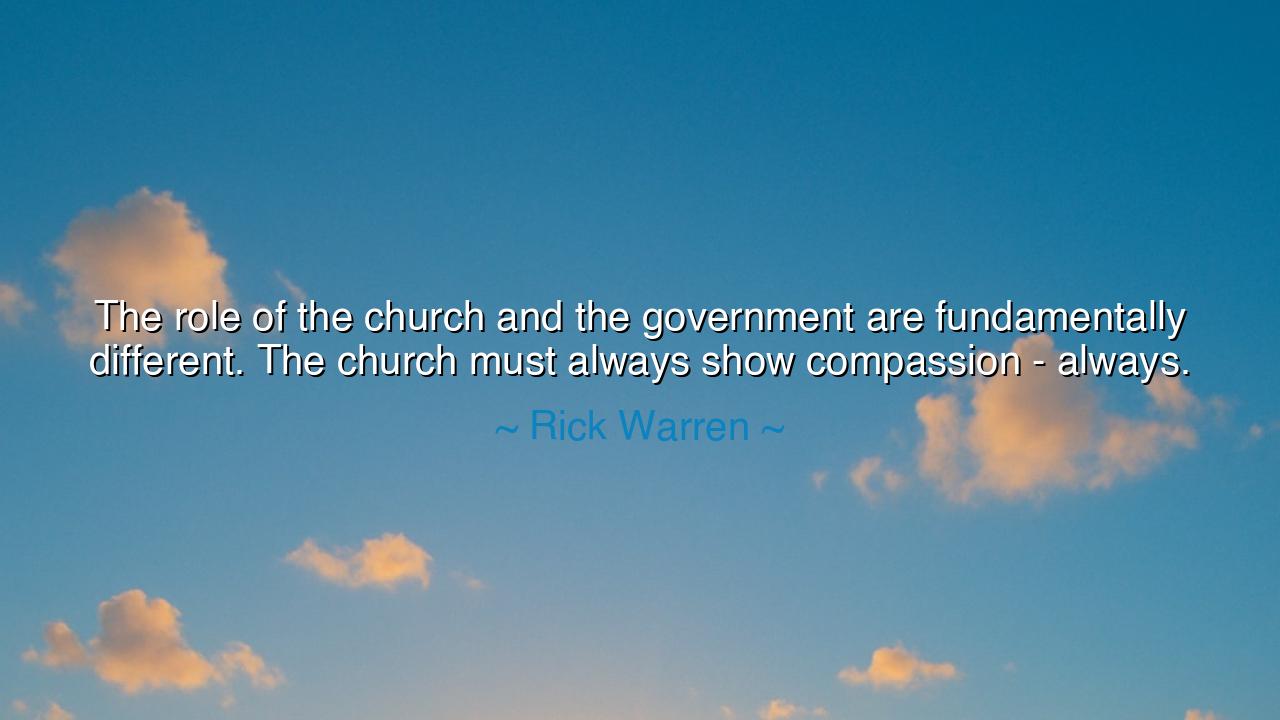
The role of the church and the government are fundamentally
The role of the church and the government are fundamentally different. The church must always show compassion - always.






The pastor and teacher Rick Warren, a man who has guided multitudes with his message of faith and service, once spoke these profound words: “The role of the church and the government are fundamentally different. The church must always show compassion — always.” In this simple but luminous declaration lies a wisdom that transcends institutions and ages. It is a reminder that while government governs through law, the church must govern through love; while the state may correct through justice, the soul of the church must heal through mercy. Warren’s words draw a sacred line between power and compassion, between authority and grace — teaching that the world needs both, but that their purposes must never be confused.
To understand the meaning of this quote, one must see that Warren is not speaking merely of religion, but of the moral architecture that sustains civilization. The government, by its nature, is built to maintain order — to create boundaries, enforce laws, and defend society against chaos. It operates by rules and consequences, for that is the only way a nation can endure among flawed and fallible men. But the church — or more broadly, the community of faith and conscience — serves another function entirely. Its task is not to judge but to restore, not to punish but to forgive, not to control but to comfort. When the government must act with firmness, the church must act with tenderness. When the law demands justice, the heart must offer grace.
The origin of this truth reaches back through centuries of struggle between throne and altar, sword and cross. From the earliest days of Christendom, thinkers wrestled with how to balance temporal power with spiritual authority. When Jesus said, “Render unto Caesar the things that are Caesar’s, and unto God the things that are God’s,” He drew a line that still echoes in Warren’s words. For Caesar governs the body, but God governs the heart. Warren’s teaching revives this ancient distinction — that the state enforces law, but the church embodies love. And though the two may at times cooperate, they must never become the same, for when religion wields the sword, compassion dies, and when government claims the soul, freedom is lost.
History has proven this truth again and again. Consider the tragedy of medieval Europe, when the church, seeking power, became entangled with kings and empires. What was meant to be a refuge for the weary became an instrument of control. In the Inquisition, compassion gave way to cruelty; the cross became the scepter. Yet, centuries later, figures like William Wilberforce in England restored the church’s true calling. Through faith and compassion, Wilberforce led the movement to abolish the slave trade — not through conquest, but through conscience. He embodied Warren’s vision: that the church’s strength lies not in its laws, but in its love for the least of these.
Warren’s words also hold a mirror to our modern world. In times of social conflict, people often cry for the government to act — to fix what is broken, to heal what is wounded. But the government can only legislate behavior; it cannot transform hearts. Compassion, the power that binds humanity, cannot be enforced from above. It must be lived from within. The church — or the compassionate individual — must stand where bureaucracy cannot: at the bedside of the sick, in the home of the poor, beside the soul that has lost hope. For laws may protect, but only compassion can redeem.
The lesson in Warren’s quote is clear and enduring: each must fulfill its divine purpose. The government must be just, but the church must be merciful. If the state forgets justice, society collapses into lawlessness; but if the church forgets compassion, civilization loses its soul. The call of the faithful, therefore, is not to seize political power, but to inspire moral transformation — to serve the broken, forgive the fallen, and comfort the forgotten. Compassion is not a choice for the church; it is its very essence.
And so, my child, remember this teaching: do not wait for governments to heal what only hearts can heal. Build your life upon compassion. When others harden, be gentle; when the world condemns, forgive; when the strong turn away, draw near to the weak. For in every act of compassion, you fulfill the higher law that transcends all empires. Governments may rule nations, but compassion rules eternity. And in that kingdom of mercy — where hearts are mended and souls restored — the true work of the church, and of humanity itself, is forever done.






AAdministratorAdministrator
Welcome, honored guests. Please leave a comment, we will respond soon